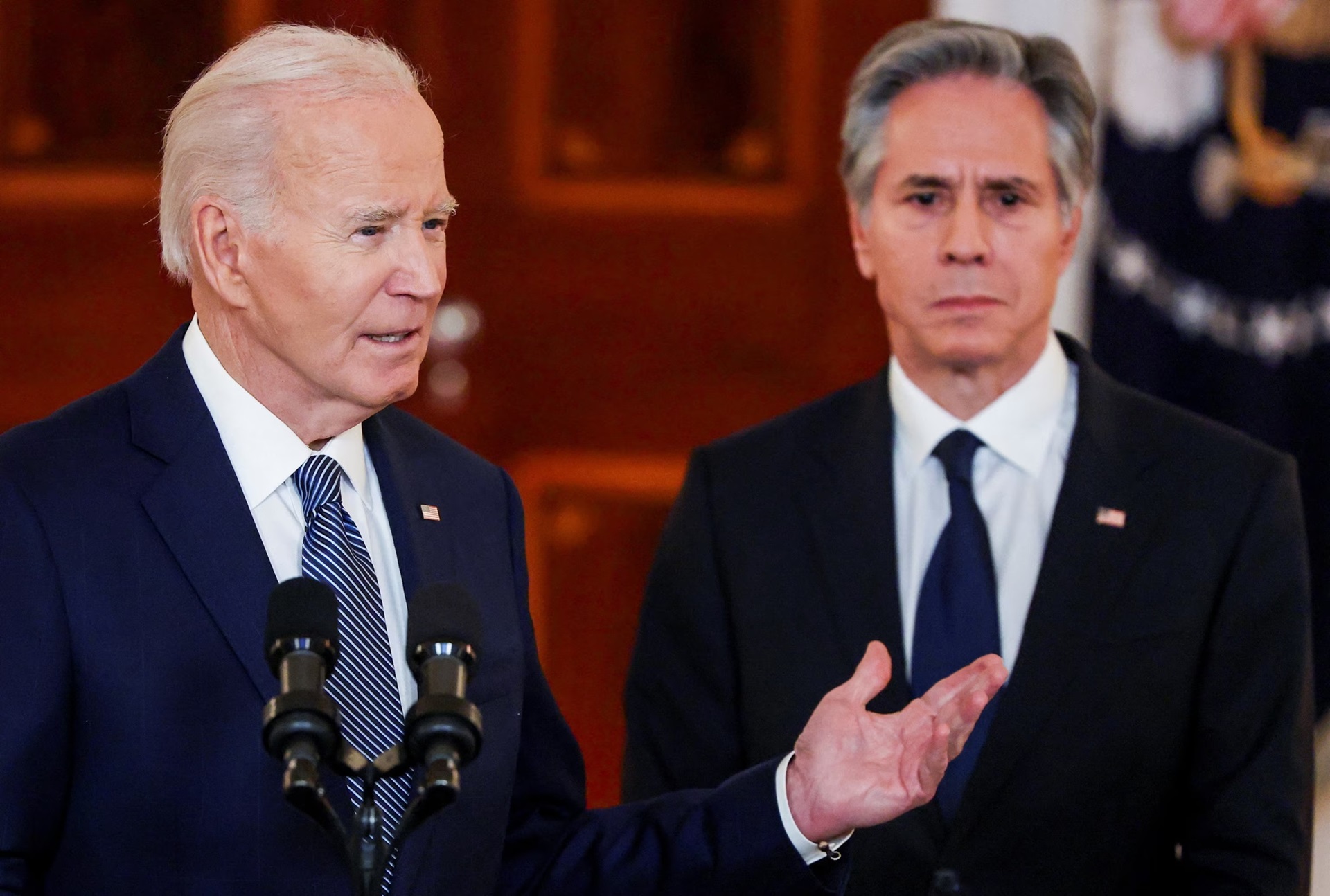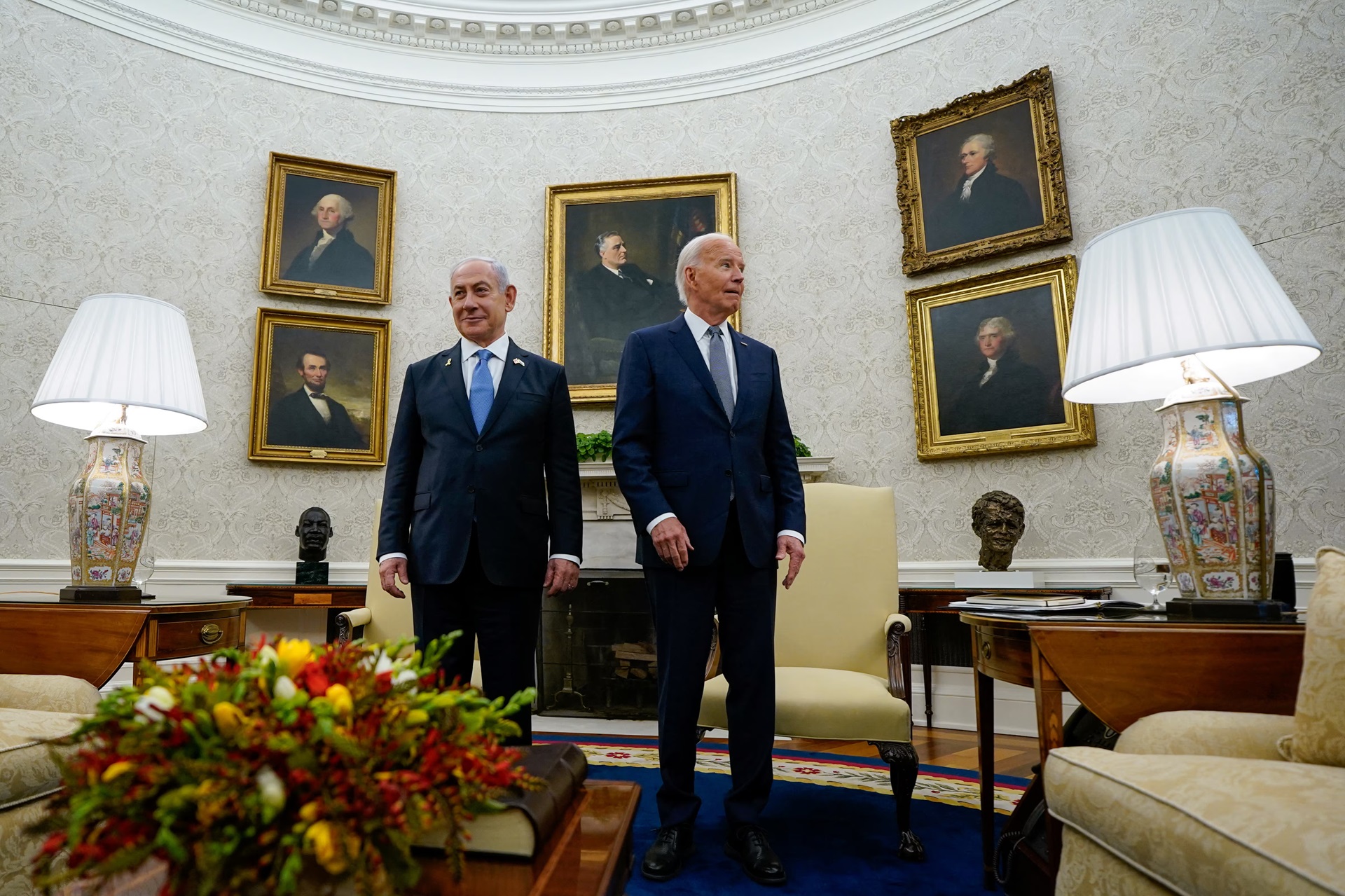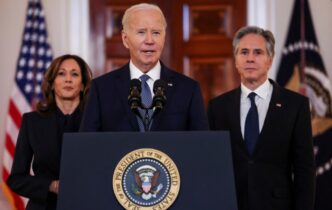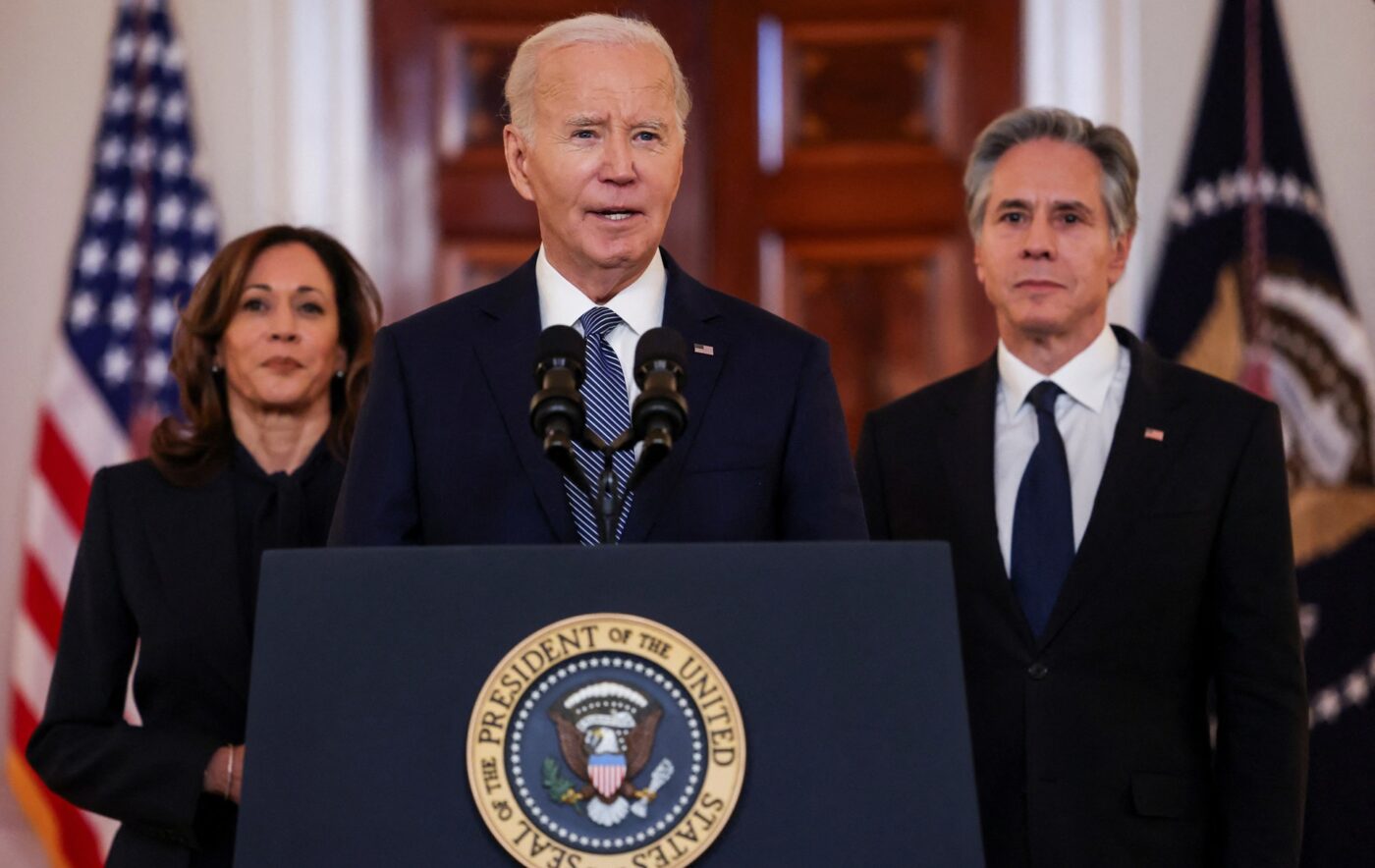In early November, as the weather in Washington, D.C. turned chilly and the days grew noticeably shorter, the interior of the White House thrummed with an anxious energy seldom witnessed beyond moments of dire national concern. Tension radiated through hallways once associated with calm deliberation, and the State Department’s spacious conference room assumed a dramatic significance. That room, typically a setting for careful negotiation and strategic assessment, became the focal point of a diplomatic crossroad in the ongoing Israel-Gaza conflict. Seated around the table were senior human rights diplomats, each aware of the immense weight of their responsibilities. Their role was to remind the administration that the United States had pledged certain moral and legal commitments on the global stage and that it needed to continue honoring them. These diplomats were mindful of their duty: to uphold foundational humanitarian values. Unrest, however, simmered just beneath the polished veneer of that room. Officials who favored more conventional approaches to foreign policy seemed wary of advisers who insisted on calling attention to what many viewed as blatant violations of humanitarian principles in Gaza. As the meeting began, the tension in the room was palpable, shaped by disagreement about how far Washington should go in demanding accountability from Israel amid a crisis that was already deepening. President Biden was no closer to realizing an Israel Gaza ceasefire deal.
Reports continued to trickle in from global humanitarian groups, describing how Israeli forces had restricted essential aid to Gaza and intensified blockades that severely limited food, medical supplies, and electricity. These accounts included firsthand stories of families displaced from their homes, struggling to find basic necessities. The sense of urgency was compounded by the looming deadline set by Secretary of State Antony Blinken, who had advanced an ultimatum: increase aid to Gaza or face repercussions under U.S. law. This deadline was meant to underscore the gravity of the situation. Failure to heed it, the administration had promised, would trigger policy consequences that could include halting arms sales to Israel. Nevertheless, even in a conference room filled with intelligence and diplomatic expertise, the path forward remained anything but certain. Diplomats from the State Department spoke bluntly about the need to enforce this ultimatum if Israel did not comply. On the other side, administration officials, preoccupied by the importance of maintaining strategic alliances, seemed reluctant to follow through with major punitive actions. Their prime concern involved sustaining a historically close bond with Israel and preserving a stance that upheld Israel’s legitimate right to defend itself against militant attacks.
The urgent conversation that day exemplified a broader conundrum in Washington. Policy circles were split between those inclined to prioritize solid alliances with Israel—regardless of critiques that Israeli military actions in Gaza were overly aggressive—and those who believed the United States had a responsibility to curb human rights abuses, even among its allies. Many in that conference room felt that time was running out and historic responsibility rested upon them. The day’s plea to “keep our word” was not only about saving political face but also about safeguarding human lives.
Senior voices in American diplomacy had consistently insisted that Washington must set a standard for protecting civilian populations. They argued that if the administration refused to penalize Israel for overstepping laws designed to shield noncombatants, the United States risked appearing hypocritical. As the meeting concluded, faces were etched with a mixture of urgency and reluctance. There was a collective realization that the path chosen in the coming weeks would influence American moral leadership and have life-altering consequences for civilians in Gaza. Much remained at stake, and what happened in that conference room foreshadowed a period of diplomatic uncertainty and intense deliberation across multiple government agencies.

Behind the scenes, President Joe Biden’s approach to foreign policy was widely understood as a mix of diplomacy, principled rhetoric, and recognition of geopolitical realities. From the outset of his term, he made it a priority to restore America’s reputation as a nation that honored international norms. The Israel-Gaza conflict highlighted this balance, as it required him to simultaneously advocate for Israel’s security, champion the rights of Palestinians seeking relief from devastating blockades, and maintain a carefully calibrated relationship with regional actors. To many observers, Biden’s objectives in the Middle East seemed noble but also fraught with complications. Israel faced persistent threats from various militant groups, including Hamas, and these threats often took the form of rocket launches into Israeli territory. Meanwhile, the residents of Gaza lived in dire circumstances under a blockade that restricted movement, hindered economic opportunities, and left them vulnerable to chronic shortages. Early in the administration, some felt hopeful that a combination of dialogue and carefully structured incentives could create a more stable environment. However, reality was proving far more resistant to those aspirations.
Within this fledgling administration, optimism flourished when successes in other arenas, such as managing the COVID-19 crisis and providing robust support to Ukraine in its fight against Russian aggression, demonstrated the White House’s potential effect on global affairs. This record suggested the administration might be capable of tackling longstanding, seemingly intractable conflicts by employing skillful negotiation and strategic pressure. But as the months went by, questions arose: why was the administration unable to replicate its successes in forging a sustainable Israel-Gaza ceasefire? Biden’s path toward a stable Israel Gaza ceasefire deal depended not just on broad intentions but also on myriad diplomatic relationships, on unpredictable local dynamics, and on the capacity to remain unwavering in certain principles while flexible in day-to-day tactics.
From a structural standpoint, American officials had constructed a phased plan intended to resolve hostilities and pave the way for longer-term stability in Gaza. The first phase of Biden’s effort to secure an Israel Gaza ceasefire deal required halting the fighting, including both Israeli incursions into Gaza and Hamas rocket attacks into Israeli territory. This was timed to begin on January 19, a date that preceded the expiration of Biden’s term by just one day. As a sign of goodwill, the plan also proposed that hostages be released and that hundreds of Palestinian prisoners be freed, a measure meant to reduce animosity and open doors for further negotiations. If the first phase ensured basic peace, the second stage was to involve a permanent cessation of offensive operations, tied explicitly to meeting benchmarks like the full withdrawal of Israeli forces from Gaza. Then, when circumstances stabilized further, the plan’s third stage aimed at humanitarian relief, infrastructure repair, and the return of hostages’ remains to their families. The ambition and scope of this approach were monumental, but so were the hurdles. While U.S. negotiators spent long nights coordinating with allies like Egypt and Qatar to secure consensus, new obstacles kept emerging. Reports of intensifying rocket fire, momentary surges in troop deployments, and continued blockades stifled any chance for an enduring pause in combat.
One central piece in the administration’s toolkit was a public and explicit red line. Secretary Blinken’s ultimatum put Israel on notice: if humanitarian conditions did not improve and essential aid remained obstructed, then arm sales could be restricted in accordance with U.S. laws. This was not an arbitrary gesture. American policy had long prohibited supporting nations that actively curtailed humanitarian relief. Upholding this law was necessary to maintain U.S. credibility. Nonetheless, as time advanced through November, it became clear that Israeli forces were continuing operations that aggravated the humanitarian crisis.
Mass displacement occurred in North Gaza, with more than 100,000 Palestinians uprooted and forced into uncertain circumstances. Pressure mounted on the administration to deliver on its commitment to hold Israel accountable for noncompliance. Despite that pressure, the United States hesitated. No serious policy action occurred once the deadline passed, sparking frustration among senior diplomats who questioned why the administration had threatened consequences yet did nothing.
Their frustration stemmed from a keen awareness that the world was watching. Each time Israeli tanks rolled further into Gaza or Israeli jets bombed residential quarters, these acts generated a torrent of scrutiny directed at the White House. Diplomatic staff argued that allowing such actions to pass without repercussions risked diminishing America’s moral sway. If Washington could not enforce its own guidelines, or refused to do so, why would any ally take similar threats seriously in the future? For officials involved in human rights advocacy, it was disheartening to see Washington remain silent even while being confronted with stark evidence of blocked aid convoys, desperate civilian conditions, and allegations that major Israeli units in Gaza were operating outside the bounds of international law. Some staff forms within the State Department, which traditionally guided America’s diplomatic and moral stance, felt sidelined. They noted how the National Security Council (NSC) had taken an unusually assertive role, sometimes dictating the words officials could or could not use in official statements. Language about the “State of Palestine” had to include the qualifier “future,” and references to war crimes or systemic human rights abuses were toned down if they implicated Israeli forces. Internally, voices rose in protest, yet the momentum still favored a position that avoided any meaningful rebuke of Israel.
Meanwhile, a potent legislative mechanism called the Leahy Law hovered on the sidelines. This law was designed to hold foreign military units accountable when they perpetrated substantial human rights violations. In principle, it empowered the Secretary of State to halt assistance to specific brigades or divisions found to have committed abuses. Despite credible accounts implicating certain Israeli units in killings and other violations, Secretary Blinken hesitated to act. Some in the administration argued that making an example of an Israeli unit would shatter diplomatic relations cultivated over decades. Others insisted that if the United States never applied the Leahy Law to a key ally—even when the evidence was overwhelming—then the law’s credibility would be severely compromised. Figures within the human rights community, as well as former State Department officials, voiced disappointment. They pointed out that ignoring robust evidence of wrongdoing eroded the very moral foundation that gave U.S. foreign policy its legitimacy. Many months had passed, and Biden had still failed to secure an Israel Gaza ceasefire deal.

While officials quietly debated these issues in Washington, events on the ground in Gaza and Israel proceeded with brutal momentum. Nightly airstrikes rattled families trying to find safety among the rubble of shelled buildings. In Israel, rockets continued to target areas that were once considered out of range, sowing fear in communities. Each day without a ceasefire meant more families forcibly uprooted, more children growing up surrounded by scenes of devastation, and a deepening animosity that made future reconciliation even more challenging. For those on the ground, the pressing question was not which high-level official would walk away with diplomatic credit, but whether tomorrow would bring more bombs, more displacement, or even more casualties. This urgent reality stood in contrast to the cautious calculations taking place in Washington. On one hand, some policy-makers dreaded the consequences that might follow if they actively used their leverage against Israel. On the other hand, senior diplomats remained convinced that ignoring such behavior risked damaging the nation’s moral standing and intensifying the conflict’s human toll.
As Biden bid farewell to his presidency, the Israel Gaza ceasefire deal stood as a bittersweet achievement—too late to prevent immense suffering and overshadowed by questions of missed opportunities. Historians and policymakers will undoubtedly reflect on the lessons of this period, analyzing what could have been done differently to achieve peace sooner.
For future administrations, Biden’s handling of the Israel Gaza ceasefire deal offers valuable insights. The importance of enforcing red lines, engaging regional mediators, and balancing domestic and international pressures cannot be overstated. Above all, it highlights the human cost of inaction and the need for unwavering commitment to diplomacy and humanitarian principles.
The overlapping roles of Biden and Trump in the ceasefire negotiations further complicated the diplomatic landscape. With Trump’s public claims and the involvement of his envoy, Steve Witkoff, the administration struggled to present a unified front. This lack of clear coordination and messaging weakened the overall effectiveness of the diplomatic efforts, allowing external actors to capitalize on the administration’s hesitations and further muddle the narrative of responsibility and success.
The human stories from Gaza and Israel underscored the urgent need for effective diplomacy. Families trapped in bomb shelters, children growing up amidst destruction, and communities living under constant threat highlighted the real-life consequences of diplomatic failures. These narratives added a deeply emotional layer to the political discourse, reminding policymakers of the lives hanging in the balance.
In the final analysis, the Biden administration’s handling of the Israel-Gaza ceasefire serves as a poignant case study in the complexities of modern diplomacy. It illustrates how internal political pressures, strategic alliances, and conflicting priorities can impede the pursuit of peace. The missed opportunities and the subsequent humanitarian fallout underscore the critical importance of decisive and consistent diplomatic action in resolving international conflicts.
As future administrations navigate similar challenges, the lessons from Biden’s experience should inform their strategies. Enforcing red lines, engaging with regional mediators, and maintaining a balanced approach between strategic alliances and humanitarian responsibilities are essential for effective diplomacy. Moreover, the administration must ensure that internal coordination and unified messaging are prioritized to present a cohesive and resolute stance on the global stage.
Ultimately, the pursuit of peace in the Israel-Gaza conflict remains an enduring and essential endeavor. The lessons learned from past diplomatic efforts must guide future actions to ensure that human suffering is minimized and that lasting stability is achieved through principled and effective leadership.
Even as the ceasefire agreement was finalized, the echoes of missed opportunities reverberated through diplomatic circles. Experts like Ghaith al-Omari, a senior fellow at The Washington Institute, criticized Netanyahu’s perception that Biden lacked the resolve to impose consequences for defiance. “Netanyahu’s conclusion was that Biden doesn’t have enough oomph to make him pay a price, so he was willing to ignore him,” al-Omari remarked. This perceived weakness emboldened Israeli leaders, fostering a sense of impunity that undermined U.S. influence in the region.
The administration’s failure to consistently enforce red lines weakened its moral authority and diplomatic leverage. Jeffrey Feltman, former assistant secretary of the State Department’s Middle East bureau, expressed concerns that the U.S. was now seen as “ineffective at best or complicit at worst in the large-scale civilian destruction and death.” This erosion of credibility has long-term implications, not just for future ceasefire negotiations, but for the broader standing of the United States in international affairs.
Media coverage played a significant role in shaping public perception of the administration’s efforts. While Biden’s team emphasized their collaborative approach with Trump’s incoming administration, the narrative was quickly overshadowed by Trump’s simultaneous claims of credit. Al Jazeera’s reporting highlighted how Trump’s premature announcement on Truth Social diluted Biden’s role, leading to confusion and diminishing the perceived effectiveness of his diplomatic initiatives.
This battle for narrative dominance hindered the administration’s ability to present a unified and effective diplomatic front. As Trump claimed the ceasefire deal as an “epic” achievement resulting from his historic victory, Biden’s efforts were portrayed as secondary and less impactful. This conflicting messaging not only muddled public understanding but also allowed critics within Biden’s own party to amplify doubts about his administration’s commitment to peace.
The administration’s inability to control the narrative around the ceasefire deal reflected broader challenges in the modern media landscape, where competing voices and rapid information dissemination can quickly overshadow coordinated diplomatic efforts. This fragmentation of the narrative further complicated the administration’s ability to achieve a cohesive and impactful diplomatic legacy.
The Biden administration’s handling of the Israel-Gaza ceasefire echoes past foreign policy missteps. Comparisons have been drawn to President Barack Obama’s approach to the Syrian civil war, where a similar hesitancy to enforce red lines led to prolonged conflict and regional instability. Critics argue that just as Obama’s administration backpedaled on chemical weapons use, Biden’s reluctance to hold Israel accountable allowed the conflict to spiral further.

Moreover, historical parallels can be drawn with President Jimmy Carter’s efforts to secure the release of hostages in Iran. Despite achieving a significant diplomatic victory, Carter’s success came too late to salvage his presidency, highlighting the importance of timing and sustained effort in diplomatic negotiations. Biden’s experience underscores the necessity of proactive and assertive diplomacy, rather than reactive and fragmented efforts, to achieve meaningful peace.
These historical comparisons serve as cautionary tales, emphasizing the importance of decisive action and consistent policy enforcement in foreign diplomacy. The lessons from Obama and Carter highlight the potential consequences of diplomatic inaction and the critical need for timely and sustained efforts to secure peace agreements.
At the core of the diplomatic failures lies a stark humanitarian crisis. The protracted conflict has left countless civilians in Gaza and Israel grappling with unimaginable suffering. Human rights organizations have documented widespread abuses, displacement, and loss of life, painting a grim picture of the war’s toll. The administration’s inability to secure a timely ceasefire not only prolonged the violence but also deepened the humanitarian catastrophe, undermining international efforts to provide relief and rebuild communities.
Personal stories from the ground highlight the urgent need for effective diplomacy. Families in Gaza remain trapped in bomb shelters, their lives shattered by relentless strikes. In Israel, communities live under the constant threat of rocket attacks, their sense of security perpetually compromised. These human stories add a visceral dimension to the political and diplomatic discourse, emphasizing the moral imperative for decisive action.
The humanitarian imperative underscores the ethical responsibility of the administration to prioritize human lives over political and strategic considerations. Effective diplomacy in the Israel-Gaza conflict is not merely a strategic necessity but a moral obligation, one that demands unwavering commitment to alleviating human suffering and fostering conditions for lasting peace.
The legacy of Biden’s handling of the Israel Gaza ceasefire deal will influence future U.S. foreign policy and diplomatic strategies. It serves as a critical case study on the importance of enforcing red lines, maintaining international credibility, and balancing domestic and international pressures. Future administrations must draw lessons from these missed opportunities to enhance their diplomatic effectiveness and uphold ethical standards in foreign policy.
Key recommendations include:
Decisive Enforcement of Red Lines: Ensuring that stated red lines are backed by consistent and meaningful actions to enforce them, thereby maintaining international credibility.
Enhanced Collaboration with Regional Mediators: Sustaining and deepening engagement with key regional players like Egypt and Qatar to facilitate comprehensive and lasting peace agreements.
Balancing Domestic and International Pressures: Navigating internal political landscapes with finesse to support robust foreign policy initiatives without succumbing to partisan divides.
Prioritizing Humanitarian Outcomes: Placing the well-being of civilians at the forefront of diplomatic efforts, ensuring that humanitarian aid and reconstruction are integral components of ceasefire agreements.
By adopting these strategies, future administrations can better navigate the complexities of Middle Eastern diplomacy, fostering a more stable and peaceful region while reinforcing the United States’ role as a credible and principled mediator.
In the final days of his presidency, President Biden could have left with a legacy of conflict resolution and diplomatic success. Instead, the unplayed symphony of a potential ceasefire stands as a haunting reminder of the thin line between peace and continued strife. The quiet moments in the Oval Office, the decisions not made, and the opportunities not seized will echo in the halls of history, serving as both a cautionary tale and a call to action for those who follow.
As the sun sets on Biden’s administration, the unresolved notes of the Israel-Gaza conflict linger, a testament to the complexities of diplomacy and the enduring quest for peace in a world fraught with division and discord. The story remains unfinished, a poignant chapter in the ongoing narrative of international relations, where every decision carries the weight of possibility and the hope for a better tomorrow.







